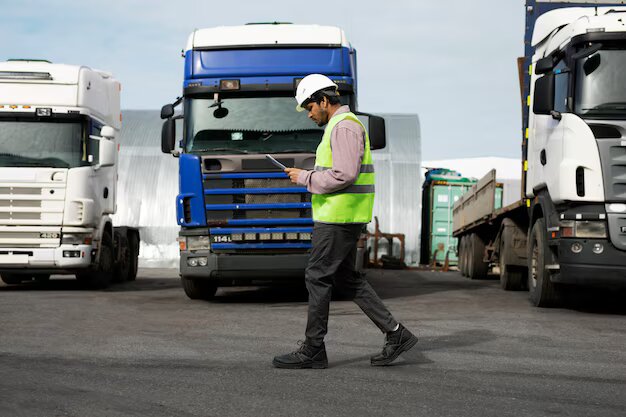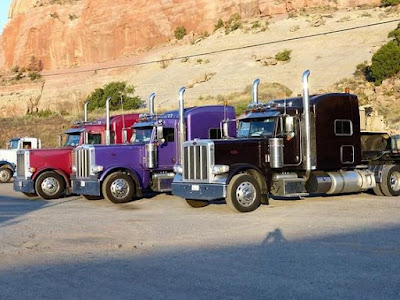The trucking industry is the backbone of global trade, ensuring goods are transported efficiently from manufacturers to consumers. However, managing logistics, coordinating drivers, and optimizing routes can be complex and time-consuming. This is where dispatcher services come into play. By acting as the central hub for communication and coordination, dispatcher services significantly improve efficiency in the trucking industry. Here’s how:
1. Streamlined Communication
Dispatcher services act as the bridge between drivers,
shippers, and receivers. They ensure clear and timely communication, reducing
misunderstandings and delays.
- Real-Time
Updates: Dispatchers provide drivers with instant updates on
route changes, delivery schedules, and potential issues.
- Centralized
Coordination: By managing all communications, dispatchers
eliminate the need for drivers to juggle multiple contacts, allowing them
to focus on the road.
2. Optimized Route Planning
One of the most critical roles of dispatcher services is
route optimization. Using advanced tools like GPS and route planning software,
dispatchers identify the most efficient paths for deliveries.
- Reduced
Fuel Costs: Optimized routes minimize fuel consumption, saving
money for trucking companies.
- Faster
Deliveries: Efficient routes ensure timely deliveries, improving
customer satisfaction.
- Avoiding
Delays: Dispatchers monitor traffic and weather conditions,
rerouting drivers to avoid disruptions.
3. Load Management and Scheduling
Dispatcher services excel at matching trucks with the right
loads and creating efficient schedules.
- Maximized
Capacity: Dispatchers ensure trucks are fully utilized, reducing
empty miles and increasing revenue.
- Balanced
Workloads: They assign loads based on driver availability,
ensuring fair distribution and preventing burnout.
- Timely
Pickups and Deliveries: Efficient scheduling minimizes waiting
times at loading docks, keeping operations running smoothly.
4. Enhanced Driver Support
Drivers are the backbone of the trucking industry, and
dispatcher services play a vital role in supporting them.
- 24/7
Assistance: Dispatchers provide round-the-clock support, helping
drivers navigate challenges on the road.
- Problem
Resolution: Whether it’s a breakdown or a delivery issue,
dispatchers quickly find solutions to keep operations on track.
- Paperwork
Management: Dispatchers handle documentation, allowing drivers to
focus on driving.
5. Technology Integration
Modern dispatcher services leverage technology to enhance
efficiency.
- Real-Time
Tracking: Tools like GPS and telematics allow dispatchers to
monitor truck locations and provide updates to shippers and receivers.
- Automated
Systems: Dispatchers use software to automate load matching,
invoicing, and scheduling, reducing manual errors.
- Data
Analytics: By analyzing performance metrics, dispatchers identify
areas for improvement and implement strategies to boost efficiency.
6. Cost Savings
By improving operational efficiency, dispatcher services
help trucking companies save money in several ways:
- Reduced
Fuel Costs: Optimized routes and minimized idle time lower fuel
expenses.
- Lower
Maintenance Costs: Efficient scheduling and reduced wear and tear
extend the lifespan of vehicles.
- Increased
Revenue: Faster deliveries and better load management lead to
higher profitability.
7. Improved Customer Satisfaction
Efficient dispatcher services directly impact customer
satisfaction by ensuring timely deliveries and clear communication.
- On-Time
Deliveries: Dispatchers prioritize meeting delivery deadlines,
building trust with clients.
- Transparency: Real-time
tracking and updates keep customers informed about shipment status.
- Problem
Resolution: Quick responses to issues demonstrate reliability and
professionalism.
Conclusion
Dispatcher Services are indispensable for improving
efficiency in the trucking industry. By streamlining communication, optimizing
routes, managing loads, and leveraging technology, they ensure smooth
operations and cost savings. For trucking companies looking to enhance
productivity and customer satisfaction, partnering with a professional
dispatcher service is a smart investment.
In an industry where time is money, dispatcher services
provide the expertise and tools needed to stay competitive and efficient.
Whether you’re a small fleet or a large logistics company, embracing dispatcher
services can transform your operations and drive long-term success.









